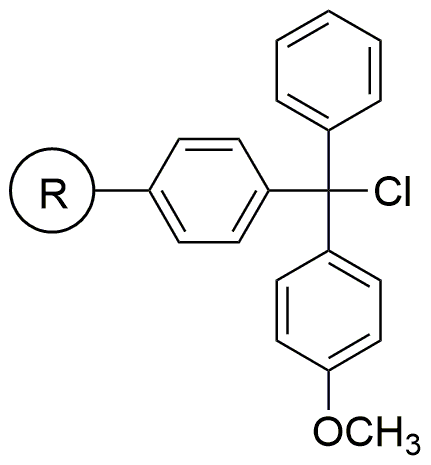4-Methoxytrityl chloride resin is widely utilized in research focused on:
- DNA and RNA Synthesis: This resin is crucial in the solid-phase synthesis of oligonucleotides, allowing for efficient attachment of nucleotides during the assembly process.
- Peptide Synthesis: It serves as a protective group in peptide synthesis, ensuring that specific amino acids are selectively modified without affecting others.
- Drug Development: Researchers use this resin to create complex molecules, facilitating the development of new pharmaceuticals with targeted therapeutic effects.
- Bioconjugation: The resin aids in attaching biomolecules to surfaces or other molecules, enhancing the functionality of diagnostic and therapeutic agents.
- Polymer Chemistry: It is employed in the synthesis of functional polymers, contributing to advancements in materials science and nanotechnology.
General Information
Properties
Safety and Regulations
Applications
4-Methoxytrityl chloride resin is widely utilized in research focused on:
- DNA and RNA Synthesis: This resin is crucial in the solid-phase synthesis of oligonucleotides, allowing for efficient attachment of nucleotides during the assembly process.
- Peptide Synthesis: It serves as a protective group in peptide synthesis, ensuring that specific amino acids are selectively modified without affecting others.
- Drug Development: Researchers use this resin to create complex molecules, facilitating the development of new pharmaceuticals with targeted therapeutic effects.
- Bioconjugation: The resin aids in attaching biomolecules to surfaces or other molecules, enhancing the functionality of diagnostic and therapeutic agents.
- Polymer Chemistry: It is employed in the synthesis of functional polymers, contributing to advancements in materials science and nanotechnology.
Documents
Safety Data Sheets (SDS)
The SDS provides comprehensive safety information on handling, storage, and disposal of the product.
Product Specification (PS)
The PS provides a comprehensive breakdown of the product’s properties, including chemical composition, physical state, purity, and storage requirements. It also details acceptable quality ranges and the product's intended applications.
Certificates of Analysis (COA)
Search for Certificates of Analysis (COA) by entering the products Lot Number. Lot and Batch Numbers can be found on a product’s label following the words ‘Lot’ or ‘Batch’.
*Catalog Number
*Lot Number
Certificates Of Origin (COO)
This COO confirms the country where the product was manufactured, and also details the materials and components used in it and whether it is derived from natural, synthetic, or other specific sources. This certificate may be required for customs, trade, and regulatory compliance.
*Catalog Number
*Lot Number
Safety Data Sheets (SDS)
The SDS provides comprehensive safety information on handling, storage, and disposal of the product.
DownloadProduct Specification (PS)
The PS provides a comprehensive breakdown of the product’s properties, including chemical composition, physical state, purity, and storage requirements. It also details acceptable quality ranges and the product's intended applications.
DownloadCertificates of Analysis (COA)
Search for Certificates of Analysis (COA) by entering the products Lot Number. Lot and Batch Numbers can be found on a product’s label following the words ‘Lot’ or ‘Batch’.
*Catalog Number
*Lot Number
Certificates Of Origin (COO)
This COO confirms the country where the product was manufactured, and also details the materials and components used in it and whether it is derived from natural, synthetic, or other specific sources. This certificate may be required for customs, trade, and regulatory compliance.


